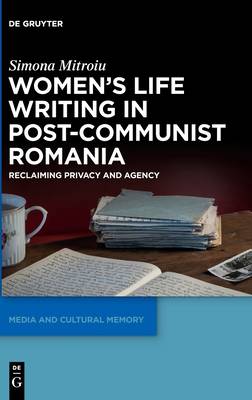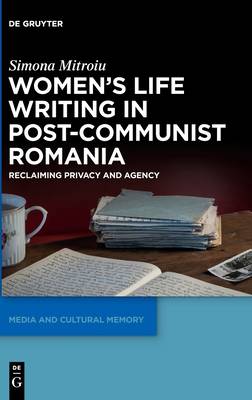
Door onderhoudswerken kan de bevestiging van je bestelling en de activatie van aangekochte e-books langer duren dan gewoonlijk. Onze excuses voor het ongemak.
- Afhalen na 1 uur in een winkel met voorraad
- Gratis thuislevering in België vanaf € 30
- Ruim aanbod met 7 miljoen producten
Door onderhoudswerken kan de bevestiging van je bestelling en de activatie van aangekochte e-books langer duren dan gewoonlijk. Onze excuses voor het ongemak.
- Afhalen na 1 uur in een winkel met voorraad
- Gratis thuislevering in België vanaf € 30
- Ruim aanbod met 7 miljoen producten
Zoeken
€ 233,95
+ 467 punten
Omschrijving
This book analyzes the impact of abusive regimes of power on women's lives and on their self-expression through close readings of life writing by women in communist Romania. In particular, it examines the forms of agency and privacy available to women under totalitarianism and the modes of relationships in which their lives were embedded. The self-expression and self-reflexive processes that are to be found in the body of Romanian women's autobiographical writings this study presents create complex private narratives that underpin the creative development of inclusive memories of the past through shared responsibility and shared agency. At the same time, however, the way these private, personal narratives intertwined with collective and official historical narratives exemplifies the multidimensional nature of privacy as well as the radical redefinition of agency in this period. This book argues for a broader understanding of the narratives of the communist past, one that reflects the complexity of individual and social interactions and allows a deep exploration of the interconnected relations between memory, trauma, nostalgia, agency, and privacy.
Specificaties
Betrokkenen
- Auteur(s):
- Uitgeverij:
Inhoud
- Aantal bladzijden:
- 168
- Taal:
- Engels
- Reeks:
- Reeksnummer:
- nr. 35
Eigenschappen
- Productcode (EAN):
- 9783110763874
- Verschijningsdatum:
- 7/11/2022
- Uitvoering:
- Hardcover
- Formaat:
- Genaaid
- Afmetingen:
- 156 mm x 234 mm
- Gewicht:
- 439 g

Alleen bij Standaard Boekhandel
+ 467 punten op je klantenkaart van Standaard Boekhandel
Beoordelingen
We publiceren alleen reviews die voldoen aan de voorwaarden voor reviews. Bekijk onze voorwaarden voor reviews.








